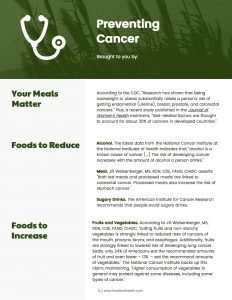Cancer and Eating Pattern Factsheet
Diet and cancer: is there a link?Many of the studies we've found indicate that there is. For example, according to the Centers for Disease Control and Prevention (CDC), "Research has shown that being overweight or obese substantially raises a person’s risk of getting endometrial (uterine), breast, prostate, and colorectal cancers." Plus, a recent study published in the Journal of Women’s Health maintains, “Diet-related factors are thought to account for about 30% of cancers in developed countries.”So let's talk about these diet-related factors. As our team delved into the research, we found that using your eating pattern to reduce your risk of cancer works in two ways:
- Decreasing your consumption of certain foods can help reduce your risk because those foods have been linked to cancer.
- Increasing your consumption of other foods can help reduce your risk because those foods have been linked to cancer prevention.
Let's take a look at each category, shall we?Foods to Decrease:Alcohol. The latest data from the National Cancer Institute at the National Institutes of Health indicates that "alcohol is a known cause of cancer. Heavy or regular alcohol consumption increases the risk of developing cancers of the oral cavity (excluding the lips), pharynx (throat), larynx (voice box), esophagus, liver, breast, colon, and rectum. The risk of developing cancer increases with the amount of alcohol a person drinks" (source).Meat. Jill Weisenberger, MS, RDN, CDE, FAND, CHWC asserts "Both red meats (beef, lamb, pig, and goat) and processed meats are linked to colorectal cancer. Processed meats also increase the risk of stomach cancer. Examples of processed meats are bacon, turkey bacon, hot dogs, salami, and ham."Sugary Drinks. The American Institute for Cancer Research recommends that people avoid sugary drinks in order to reduce their cancer risk.Foods to Increase:Fruits and Vegetables. According to Jill Weisenberger, MS, RDN, CDE, FAND, CHWC, "Eating fruits and non-starchy vegetables is strongly linked to reduced risks of cancers of the mouth, pharynx, larynx, and esophagus. Additionally, fruits are strongly linked to lowered risk of developing lung cancer. Sadly, only 24% of Americans eat the recommended amounts of fruit and even fewer – 13% — eat the recommend amounts of vegetables." The National Cancer Institute backs up this claim, maintaining, "Higher consumption of vegetables in general may protect against some diseases, including some types of cancer."Of course, this is all just a start when it comes to the science of cancer prevention. To learn more, check out these sites:
- The National Cancer Institute
- CDC: Cancer Prevention and Control
- Cancer Prevention Tips from the Mayo Clinic
- American Cancer Society
And don't miss this free diet and cancer factsheet! Communicate additional key facts with these eye-catching materials![shopify embed_type="collection" shop="nutrition-education-store.myshopify.com" product_handle="myplate-plates"]
Communicate additional key facts with these eye-catching materials![shopify embed_type="collection" shop="nutrition-education-store.myshopify.com" product_handle="myplate-plates"]


